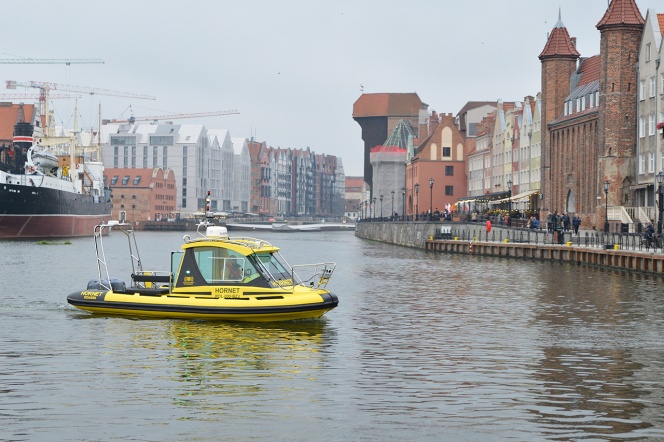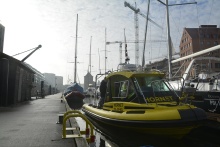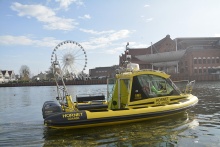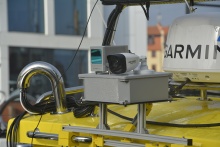Date added: 2022-11-22
Unmanned surface vessel to enhance security of Polish ports and offshore wind farms

The vessel with its basic equipment is ready. Gdańsk Tech researchers are now working on solutions within the scope of edge and cloud technologies, applying artificial intelligence and machine learning. They plan to develop and implement a reliable wireless communication system (i.a. resistant to the signal blocker or jamming devices), for communication with numerous unmanned units simultaneously.
„Hornet” has already been tested by the researchers on Motława and Martwa Wisła channel. Now – for the winter season – it will return to a hangar. Before returning on water, it will obtain additional equipment elements, aiding its functionality and enabling first autonomous operation.
Intelligent solutions based on edge and cloud technologies
– The interest in safety critical systems, based on intelligent data analysis, is growing – says Łukasz Kulas, DSc, Eng, Gdańsk Tech professor, the manager of TRANSACT project team from the Department of Microwave and Antenna Engineering at the Faculty of Electronics, Telecommunications and Informatics, the coordinator of the Digital Technologies Center at Gdańsk Tech. – Our business partners search for reliable solutions enhancing the security of cyber-physical systems, with low installation and maintenance costs. In response to these expectations, both edge and cloud technologies will be applied in the project, consequently making the solutions more resistant, universal and intelligent.
Apart from modern navigation sensors, „Hornet” will be equipped with different types of advanced sensors known from autonomous vehicles, such as lidars, which precisely detect the shapes of objects on water surface, as well as short range radars, infrared and vision systems, and acoustic sonars, allowing for exact imaging of what is underwater.
– Data collected from the devices/sensors will be stored within onboard computer (on the network edge). Through fast data processing, the vessel will be able to make decisions in the future – says Prof. Kulas. – Different types of systems that secure the maneuvering and operational safety will be installed. The vessel will move on a planned route, however upon encountering an unexpected object, the vessel will bypass it or stop. The mechanisms that will be implemented here will be similar to those in cruise control in cars.
In turn, solutions related to cloud computing will consist in checking how the boat operates and how it makes the appropriate decisions.
– In the cloud, it will also be easier to obtain information about the positions of other objects, the weather, the optimal route, how to save fuel, etc., and, if necessary, to constantly improve the artificial intelligence algorithms working on the vessel - adds the project manager.
The project will apply solutions developed in another project, including energy-efficient smart antennas, an original product of th Gdańsk University of Technology, used to increase the reliability of wireless communication. These antennas can reconfigure their operation in seconds to neutralize the impact of cyber attacks that aim to jam wireless communication. Application of such solutions has already attracted interest, i.a. of Airbus company.
Collaboration of Gdańsk Tech with PRS
In September 2021, Gdańsk University of Technology and Polish Register of Shipping S.A. (PRS) signed a letter of intent to tighten research and development cooperation aimed at developing new generation, original, innovative (semi-) autonomous and unmanned surface platforms, mainly within the scope of TRANSACT project. PRS will give opinion on the safety of the vessel.
– The aim of the collaboration is to develop and test the security of new technologies, solutions and algorithms, including distributed cyber-physical systems connected with cloud solutions, reliable wireless communication, artificial intelligence and machine learning algorithms, for surface (semi-) autonomous or unmanned vehicles (e.g. USV) – specifies Grzegorz Pettke, director of PRS Ship Division. – Joint activities during the implementation of this project are to contribute to the development of innovative and safe procedural and legal solutions, in accordance with the guidelines of the International Maritime Organization (IMO). This will enable commercialization of this type of water transport, making Poland and the Polish shipbuilding industry an important center for the development of new technology – adds Grzegorz Pettke.
For local needs and worldwide giants
The prototype of the vessel is being developed as part of the research and development project "TRANSACT - Transform safety-critical cyber-physical systems into distributed solutions for end-users and partners".
It is an international project with a total budget of EUR 26.5 million (the project budget for Gdańsk Tech is over EUR 1 million), implemented under the HORIZON 2020 KDT-JU program in cooperation with partners from Germany, Finland, Denmark, Norway, Spain, Austria, Belgium and the Netherlands.
The autonomous vessel from Gdańsk Tech - which, in addition to inspecting ship canals and taking sampling water for detection of possible contaminants, can be used to monitor offshore structures, including future wind farms – attracts interest of European companies.
Parallel to the European project, cooperation on the local level was initiated as part of the Smart Specializations of Pomerania. This initiative was launched by the Marshal's Office of the Pomeranian Voivodeship, and one of its goals was to consolidate and tighten cooperation between the maritime industry and ICT in Pomerania, which are animated by Gdańsk Entrepreneurship Incubator Starter and the “Interizon” ICT Cluster, respectively. As a result of cooperation, a working group was formed by “Interizon” ICT Cluster, which gatheres entities interested in joint development of products in the field of unmanned and autonomous vessels.
– The openness of Gdańsk University of Technology to collaboration allows ICT companies to create components, including advanced algorithms and systems that are part of the solutions of the future autonomous vessel. We hope to create a value chain with many Polish companies and an innovative product. We already invite all interested entities to cooperate - emphasizes Jarosław Parzuchowski, president of the board of the “Interizon” Cluster Foundation.




